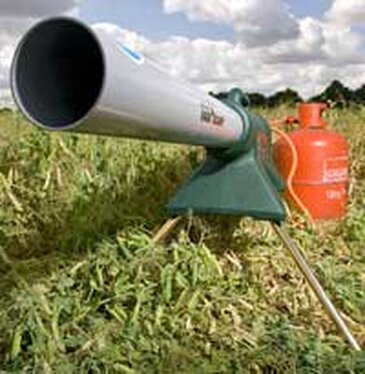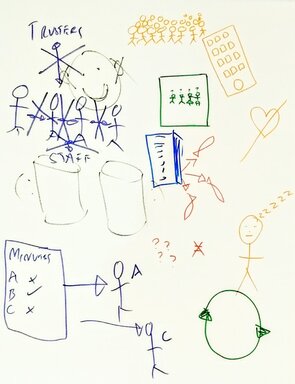|
Reflexivity – a research word. It means that when we explore something such as a strategy for the future or an idea for a significant life change, who we are in relation to what we are looking into will influence what we see – and what we don’t see – how we do it and what conclusions we draw from it. This is because our subconscious personal and cultural assumptions and biases along with our psychological filters and defence mechanisms can create blind spots and hot spots. Gareth Morgan characterised the blind spot phenomenon as, ‘People have a knack for getting trapped in webs of their own creation.’ In other words, we can get stuck in our own way of seeing things. Similarly, Morgan characterised hot spots by, ‘What passes for rationality is often irrationality in disguise.’ That is, we may mask and try to justify our emotional responses by rationalising them. Reflexivity is the skill of identifying and addressing such spots to minimise their influence. Blind spots are what we are not thinking about. They touch on what is invisible to us. They are concerned with (un)awareness. They are created by our beliefs. They reflect the paradigms we hold. If we challenge them, it can feel mind-bending. Hot spots are what we are not talking about. They touch on what is sacred to us. They are concerned with relationships. They are created by our values. They reflect the passions we hold. If we challenge them, it can feel heart-wrenching. Here are some reflexive questions that can help. Blind spots: What are we assuming? What appears self-evident to us and why? Who do we need to involve in our exploratory process? How can we draw in contrasting perspectives and ideas? Hot spots: What are we avoiding? How will we handle power dynamics and vested interests? What will we do if we feel threatened or defensive? How can we hold robust conversations that feel safe? How do you deal with the hot and the blind?
60 Comments
‘Thud…BANG!’ At its worst, it’s every 2.7 minutes. They go off every day, 24 hours a day, 7 days a week, 9 months a year, where I live. Farmers use these gas guns – which are like small canons – to attempt to scare birds from their crops. They are very loud…and largely ineffective. In an attempt to improve their effectiveness, farmers are increasing the number they install in their fields and the frequency of the bangs. It’s as if more canons and more bangs will scare away more birds.
The problem is: it doesn’t work, it drives local residents crazy and it is actually counter-productive. Research shows that birds quickly ignore the bangs. They realise there is no actual threat. The more the bangs, the more the birds become immune to them. In fact, research also shows that, over time, the birds are actually attracted by the bangs, using them to locate sources of food. So, apart from the dubious ethics of using these guns close to residential areas, what is going wrong here? The simple answer is that these farmers have inadvertently locked themselves into a pattern of faulty assumptions and self-defeating behaviour. Their desperation to protect their crops drives them away from rational thought to a more defensive and defended stance. If they could find a way to step back far enough to revisit the results they desire and the factors that support or undermine them, they could potentially discover new tactics that would make a more positive difference. Organisations call this stepping back to examine and challenge implicit assumptions, to reflect on and address causal and influencing relationships, strategy mapping or creating theories of change. Professionals who apply the same principles to their work call it reflective practice. It’s about being willing to pause-reflect-act in the midst of the busy-ness of doing in order to think widely and deeply, conduct research, learn from experience and produce better results. How do you do it? Have you tried reasoning with someone when they’re feeling intensely emotional? It’s hard to think clearly, think straight, when we’re stressed. Some brain research says it’s almost impossible. When we’re stressed, we flick out of reasoning mode into fight-fight-freeze mode. The brain gets flooded with chemicals that are intended to enable us to survive an emergency, a crisis. Trying to hold a rational conversation with someone in that state can be like pouring fuel onto a chemical fire.
Cognitive behavioural psychology points us helpfully towards some signs that a person may be in that kind of emotional place. For example, they may be speaking in very black-white/either-or terms, unable to see nuances or alternatives in a situation. They may be assuming intentions in others or predicting outcomes with unfounded certainty – as if they know the future for sure. Physically, they may be struggling to rest or sleep, missing meals or avoiding normal patterns of social contact. The vivid image that comes to mind for me is that of a lot of dust being kicked up into the air. Until the dust settles, we are unable to see clearly. This is a reason why leaders who try to lead change and transition as a purely rational-technical process often encounter greatest resistance or other attitudes or behaviours they consider irrational. It’s also a reason why coaching and training may fail if the coach or trainer doesn’t take the client’s or group’s emotional state into account. So what, if anything, can we do to address this? We can offer time and space for people to feel and process their emotions. ‘How are you feeling as we talk about this?’ As the person or group talks, the dust often settles enough for them to start to make sense of their experience and to see and discuss the beginnings of a way forward. We can also offer empathy and support. ‘What do you need?’ It values and respects the person or group and shows care, responsiveness – and standing-with. A baptism of fire. I had just moved to the city. It was a new community development project. On a local housing estate, a gang of youths was harassing residents at night. This mostly involved stopping people at knife-point or setting fire to litter stacked against people’s house doors. Here was my mission…if I chose to accept it: to work at night, infiltrate the gang, stop what they were doing and convince them to do something more constructive with their lives. I was 21 years old, wore an earring, combat trousers, white trainers and black leather jacket. They thought I should fit in.
I worked alongside Dan, an experienced detached youth worker. We set out at 10pm each evening, wandered the streets and hoped to find the gang. I wondered what would happen when we did. The youth worker gave me two practical words of advice: ‘1. Always carry money and, 2. Always ensure we are outnumbered.’ I felt puzzled, laughed nervously and replied, ‘Surely you mean 1. Never carry money and, 2. Always ensure we outnumber them? Isn’t that a better way to stay safe?’ This was my first encounter with counterintuitive thinking in youth and community development work. Dan elaborated: ‘If a gang tells you to hand over your money and you do, they are likely to leave you alone. If you say you have no money, they probably won’t believe you and may well attack you to rob you.’ I responded, ‘Oh – and outnumbered..?’ He replied, ‘If we outnumber them as we approach them, they may feel threatened and attack us. If they outnumber us, they are less likely to feel threatened and more likely to be curious.’ Later that night, we did find the gang huddled under a dim street light. Dan walked casually into their midst, lit a cigarette, smiled…and said, ‘Hi.’ DeBono calls this lateral thinking. It’s a way of approaching a person or situation that involves challenging default perceptions, instincts, logic, decisions and actions and trying out radical alternatives instead. It’s like the judo teacher who instructs, ‘If an aggressive person grabs you by the lapels and pulls you forward, walk towards them rather than instinctively pull back.’ Jesus modelled it to dramatic effect. It can feel mind-bending, universe-warping, paradigm-shifting. It can be hard to do. Yet it can also yield creative and innovative results. What have been your best counterintuitive moments, insights and ideas? The team decided to work on clarifying its purpose, it’s raison d'être, it’s answer to the, ‘What are we here to do?’ question. It had been thinking about its ways of working, its team meetings, its mode of operation. It made sense to step back, at least one step, before stepping forward. As team coach, I stepped in briefly to suggest that they start by clarifying the questions they were seeking to answer. They settled on, ‘What is our optimal role?’ and ‘How can we add value?’
I asked again, ‘So how might you do this?’ A team member responded quickly, ‘Let’s discuss it and see what we come up with.’ The others nodded in agreement. As they turned to talk, I interrupted by pushing a metaphorical pause button, ‘And how else could you do this?’ They looked puzzled then one said, ‘We could each write down a purpose statement on a post-it note then compare and contrast what we’ve written?’ I repeated, ‘And how else could you do it?’ They looked confused and then thought hard. ‘We could split into 2 x 3s, work on one question each then compare?’, ‘We could brainstorm ideas on a flipchart?’, ‘We could share our visions of a team from hell, what to avoid at all costs?’, ‘We could draw pictures instead of writing words?’ They combined the final 3. Each person grabbed a coloured pen, stepped up and a provocative, vivid, collage emerged. Their chosen technique generated laughter, insight and great ideas! The principle here is how to challenge habitual, default patterns of behaviour, how to pause and reflect critically and creatively before diving into action. Posing the simple question, ‘How else could we do this?’ can significantly enhance team energy, engagement – and effectiveness. What’s your angle? We use this expression to check out a perspective, a way of seeing things, of presenting things. The angle itself is designed to convey something as interesting, eye-catching, novel, unique. There’s another way of thinking about ‘angle’ too. A friend commented yesterday that, if we look at a protractor, we see how a slight shift at the centre leads to a significantly different end point at the perimeter. The shift represents a change of direction and trajectory.
So here we are at the start of a New Year. The decisions, the angles, we take, here and now, will influence where we finish in the future. They may seem small and insignificant in the moment yet, each time we change our angle, the direction in which we face, we change our trajectory too. In many aspects of life, the cause-and-effect consequences are not as linear and predictable as lines on a mathematical tool. Nevertheless, it’s as if every choice and decision, in some way, counts. We can also look at our lives, circumstances, choices and decisions, from different angles. Leaders, coaches, OD and trainers refer to this as ‘reframing’. It could involve, say, looking at ourselves, our relationships and situations through different metaphorical frames or lenses, from different angles or vantage points, from different points in time or stakeholder perspectives etc. This can open up new insights and possibilities that may otherwise lay obscure or hidden to us. I believe this is where coaching to develop critical reflective practice can be so important, valuable and useful. It can enable us to grow in awareness of our beliefs, values, assumptions and preoccupations – our default angles, if you like. It can enable us to consider fresh options and implications that will guide our focus, attention, behaviour, decisions and actions. It can enable us to live authentic lives and to work with greater insight and freedom. So – what’s your angle? |
Nick WrightI'm a psychological coach, trainer and OD consultant. Curious to discover how can I help you? Get in touch! Like what you read? Simply enter your email address below to receive regular blog updates!
|






 RSS Feed
RSS Feed